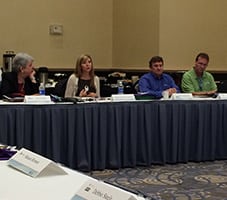EPCE: An Extra Tool for Workforce Development
If you work for a power generator or utility, chances are good that your company has concerns about filling open positions with qualified people. Though many utilities work closely with local community colleges, that approach often is not enough, and that’s where the Energy Providers Coalition for Education (EPCE) can help.
This year for the first time, the EPCE meeting was co-located with the ELECTRIC POWER Conference & Exhibition in Rosemont, Ill. After the Monday morning members’ business meeting, EPCE Director Christine Carpenter (photo) explained that because workforce numbers change from year to year, it can make developing training programs with community colleges “unsustainable.” In contrast, because it is a nationwide and industry-wide alliance, EPCE can make online, industry-approved training options more viable.
Among the participants in the co-located Energy Providers Coalition for Education meeting on Monday were (left to right): Susan Kannel and Christine Carpenter of EPCE, Steve Gackstetter of Exelon, and Jim Auld of Florida Power & Light
For the past 14 years, the nonprofit group has served as a shared resource for the industry, working with both member companies and educational institutions to provide quality online education. Currently partnering primarily with Bismarck State College, Excelsior College, Clemson University, and Worcester Polytechnic Institute, EPCE brings in educational partners who can address a particular need. It has even begun working in a hybrid manner with its online educational partners and local community colleges with which companies may have existing relationships.
EPCE can help employees access individual courses—in areas ranging from power technology to cybersecurity to smart grid—as well as degree programs. At 1,872 employee/student enrollment to date, the numbers for fiscal year 2015 are already above last year’s total of 1,858. Less than a third of current students are from the power generation sector of the industry, because, as Carpenter confirmed, the transmission and distribution sector is feeling more pain at the moment to fill the pipeline with more qualified employees. However, the offerings for power professionals include training on a new online simulator of a generic pressurized water reactor developed at Bismarck State College.
As the EPCE motto suggests, the group can be “An Extra Tool in Your Toolbox.” For more information, visit the EPCE booth #649 or learn about all the options at epceonline.org.
—Gail Reitenbach, PhD, POWER editor
